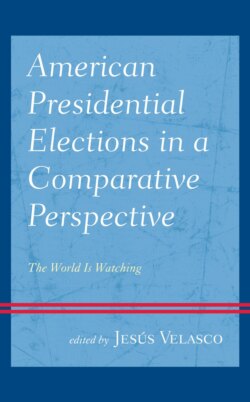Читать книгу American Presidential Elections in a Comparative Perspective - Группа авторов - Страница 9
На сайте Литреса книга снята с продажи.
Introduction
Оглавление
“Faithful to its origins in its domestic and foreign policy alike, the United States has always ignored the others…. The others do exist…. [But] not only do ‘we others’ make up the majority of human race, but also each marginal society, poor though it may be, represents a unique and precious version of mankind. If the United States is to recover fortitude and lucidity, it must recover itself, and to recover itself it must recover the ‘others’—the outcast of the Western world.”
—Octavio Paz, “Mexico and the United States,” 1979
In the twenty-first century, the United States has been the subject of intense criticism from people and governments around the world. In 2003, thousands of people openly protested the American invasion of Iraq. In February 2003, 750,000 people took to the streets of London to protest the planned invasion. Similar protests took place in Germany, France, Italy, Spain, Australia, and New Zealand.1 An estimated 10 to 15 million people marched in more than 600 cities to oppose President George W. Bush’s decision to send American soldiers to topple the regime of Saddam Hussein in Iraq.2
Prominent European intellectuals vocally criticized the US-led invasion. Prominent German scholar Jurgen Habermas and French philosopher Jacques Derrida publically denounced America’s non-compliance with United Nations resolutions and international law. These intellectuals were overwhelmed by the spectacle of US military preparations they were witnessing, which they called a “morally obscene division.” They write:
Like searchlights, they [US planners] picked out the civilized barbarism of coolly planned death (of how many victims?) and of torments long since totaled up (of how many injured and mutilated, how many thirsty and hungry) of the long-planned destruction (of how many residential districts and hospitals, how many houses, museums and markets). As the war finally began, the Ernestjunger aesthetic of the skyline of nighttime Baghdad illuminated by countless explosions seemed almost harmless.3
Italian thinker Umberto Eco declared that Bush was highly ignorant about Iraq, its people, and its culture.4 French philosopher and scholar Regis Debray argued, “Puritan America is hostage to a sacred morality; it regards itself as the predestined repository of God, with a mission to strike down evil. Trusting in Providence, it pursues a politics that is at bottom theological and as old as Pope Gregory VII.”5 Spanish intellectual Fernando Savater lamented the “massive aggression against a dictatorship” (Iraq) and argued that the attack demonstrated a clear path “toward a planetary order founded only on the hegemonic will of the greatest military power and not on the agreements assumed by the concert of countries endowed with state laws.”6 In sum, intellectuals around the world acknowledged that the United States had the military power to invade any country, but lacked the support of the international community to do so. The Iraq War went far to discredit President George W. Bush internationally. According to The Economist, Bush had “presided over the most catastrophic collapse in America’s reputation since the second war.”7
Today, a new discontent has emerged in the world, a discontent that is seriously damaging the United States’ reputation yet again. This time, the objection is not a rejection of American foreign policy, military engagements, or interventionist behavior. It is actually a critique of the nation’s domestic affairs: its political system, the nature of its elections, the quality of its democracy, and the character of its leaders. It is dismay at the poverty of American politics and problems internal to the American political system that have raised intense concern. The reaction reveals the extent to which American politics and policies have a profound impact around the world. At the same time, American elections are also opportunities for other nations to reflect on their own politics and national identity.
The international community’s current attention to the United States derives in large measure from the outcome of the last presidential contest and from events in the first eight months of the Trump administration.8 Beginning in mid-2015, observers around the world watched the presidential campaign with curiosity and astonishment. Donald Trump’s election seemed inconceivable. For many, his pronouncements were incomprehensible. No cultural codes or translations made them intelligible. The current American president was described as ignorant, authoritarian, misogynist, arrogant, xenophobic, racist, and even fascist. Trump’s personality, ideas, and behavior were frightening—he was the new leader of the most powerful country in the planet. As it often happens, dismay at Trump became dismay at an entire nation. Many could no longer recognize the country or the democracy that Alexis de Tocqueville and James Bryce once admired.9
This book presents views of the United States and the 2016 presidential election from the perspective of twelve countries. It seeks to show how nations from Asia, Europe, and Latin America have perceived the United States historically, and how their longstanding perceptions have been modified or confirmed by the 2016 election. This is a book about what “the other” thinks, and about “the others” views of American domestic and foreign policy. It is a book about other countries’ perceptions of the United States.
This introduction addresses four broad themes that frame the chapters that follow. First, I will examine the challenges involved in studying two different topics at the same time: views about the United States, and perceptions of the 2016 presidential election. Second, I will briefly examine why a domestic political issue such as the American presidential elections is important for the world. Third, I will discuss how presidential character has become a central concern for both American citizens and for foreigners. Finally, I will explore how income inequality, the mass media in electoral campaigns, racism and xenophobia, and the crisis of the American political system contribute to a perception of the decline of American democracy. In addressing each of these topics, I will present the American view alongside the perceptions of observers and mass publics in several countries around the world.
